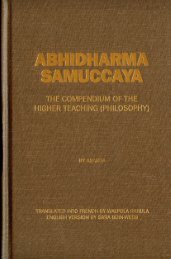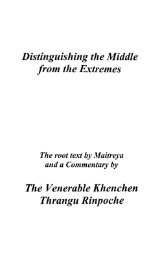Thirty_Years_of_Buddhist_studies,Conze
Thirty_Years_of_Buddhist_studies,Conze
Thirty_Years_of_Buddhist_studies,Conze
Create successful ePaper yourself
Turn your PDF publications into a flip-book with our unique Google optimized e-Paper software.
28 <strong>Thirty</strong> <strong>Years</strong> <strong>of</strong> <strong>Buddhist</strong> Studies<br />
Hu-shih is an historian who wants to know exactly what<br />
happened, how, and in what sequence. For Suzuki, on the other<br />
hand, "Zen is above space-time relations and naturally above<br />
historical facts 11 . Arthur Waley tried to mediate between the<br />
two with a parody <strong>of</strong> Han Shan:<br />
11 Water and ice do one another no harm;<br />
History and religion—both alike are good".<br />
There is no time here to give the reasons why excessive<br />
attention to the facts <strong>of</strong> <strong>Buddhist</strong> history must do harm to the<br />
spiritual vision <strong>of</strong> the dharma. I must be content to distinguish<br />
between three kinds <strong>of</strong> historian—the scientific, the humanistic<br />
and the transcendental. The first <strong>studies</strong> a butterfly after killing<br />
it and fixing it with a pin into a glass case, where it lies quite still<br />
and can leisurely be inspected from all angles. The second lets it<br />
fly in the sun, and looks wonderingly at its pretty ways. The<br />
third assures us that a man will know a butterfly only if he<br />
becomes one. As a creative thinker Suzuki tells the descriptive<br />
historian, whether scientific or humanistic, that Zen must be<br />
grasped within, and not as an outside historical fact, and that<br />
only by actually becoming Zen can one know it. Although his<br />
demands may be rather hard on the average historian, I see no<br />
reason to disagree with him.<br />
Apart from Suzuki's overtowering eminence, his effect on<br />
some Western intellectuals has provoked unfavourable<br />
reactions. Unsuspectingly Suzuki fed an Eastern form <strong>of</strong><br />
spirituality into a predominantly ex-Protestant environment<br />
which, having lost all touch with spiritual tradition, gravitated<br />
inevitably towards a self-assertive nihilism. Stirred by his<br />
message, a vast literature on "Zen" arose in England, France,<br />
Italy, Germany, and the U.S.A., ranging from positively stuffy<br />
and ultra-respectable "square" Zennists to the wild whoopees<br />
<strong>of</strong> Mr. Kerouac and his Beatniks. 1 All that there is in these<br />
books about Zen comes from Suzuki, and he is held responsible<br />
for the misunderstandings they contain. 2 If Suzuki is to be<br />
1 In this connection Allan Watt's pamphlet on Beat Zen, Square Zen<br />
and Zen (1959) is <strong>of</strong> some interest.<br />
2 So Chen-chi Chang, "The nature <strong>of</strong> Ch'an (Zen) Buddhism 9 ', Philosophy<br />
East and West VI 4, 1958. Though it makes some telling points<br />
against some <strong>of</strong> the vulgarizers, this article makes the essential soundness<br />
<strong>of</strong> Suzuki's own work quite apparent.




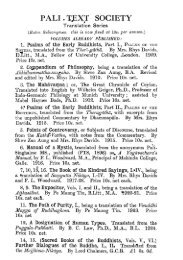




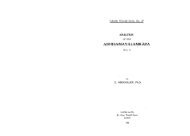


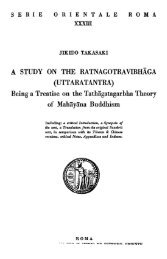
![Long Discourses of the Buddha [Digha Nikaya]](https://img.yumpu.com/32792419/1/164x260/long-discourses-of-the-buddha-digha-nikaya.jpg?quality=85)
